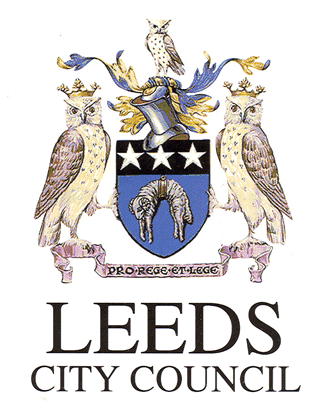Leeds
Contents
- 1 Quote
- 2 Appearance
- 3 City Device
- 4 Climate
- 5 Economy
- 6 Geography
- 7 History
- 8 Vampiric History
- 9 Population
- 10 Arenas
- 11 Attractions
- 12 Bars and Clubs
- 13 Cemeteries
- 14 City Government
- 15 Crime
- 16 Citizens of the City
- 17 Current Events
- 18 Fortifications
- 19 Galleries
- 20 Holy Ground
- 21 Hospitals
- 22 Hotels & Hostels
- 23 Landmarks
- 24 Maps
- 25 Market Places
- 26 Monasteries
- 27 Monuments
- 28 Museums
- 29 Neighborhoods
- 30 Parks
- 31 Private Residences
- 32 Restaurants
- 33 Ruins
- 34 Schools
- 35 Shops
- 36 Theaters
- 37 Transportation
- 38 Vampires of Leeds
- 39 Websites
- 40 Errata
Quote
Appearance
City Device
Climate
Economy
Geography
History
The history of the Yorkshire region stretches back far beyond the rise of Leeds. For centuries, York stood as a bastion against Scotish marauders, only to be sacked and re-fortified anew. With the unification of Scotland and England in 1603, York's importance diminished. Over the next few centuries, it stagnated, its population disappearing to more prominent cities. With the rise of Leeds as an industrial power, York itself has become a town of 150,000, boasting culture and history, but no real importance.
Leeds is the product of unchecked industrial expansion and lasiez-faire economic policies, unchecked by any sense of social justice or moderation. The city rose from nowhere during the industrial revolution, replacing ancient York as the center of population on the Scottish frontier. As quickly as it rose, Leeds's industry faltered and fell to urban blight. In the early 21st century, it stands a smog-filled industrial wasteland, its declining population barely served by a crumbling infrastructure that was never truly able to support the population. Crumbling factories sit amid fields of toxic waste, and most residential blocks host two or three houses stripped of all valuables (particularly plumbing pipes and electrical wires), and occupied only by the homeless and desperate. Still, Leeds remains England's second largest city with an uncounted urban population that may push 1 million.
Vampiric History
Yohanus of Eboracum (known in later eras as John of York) was the first to rally to Mithras's side against the triumverate. In his view, he was never properly rewarded for this act of trust and faith. In a letter coppied to all kindred of note in the isles, John accused Mithras of failing to properly honor his liegemen, and declared his alliance with Robert the Scot and the Courts of Love. John and his followers were crushed and the Barrony of York passed to the warlike Gangrel Willem Dowd.
Dowd survived the destruction of his sire Aethelwulf by the Toreador of Edinburgh during the first decade of the 17th century. He remained a strong threat against Scotish intrasigence for more than two centuries. As his eyes remained focused north, however, he ignored the changes happening within his own domain. Anarchs and Sabbat streamed into the growing population center of Leeds. The Sabbat laid siege to York from their defacto stronghold in Leeds in 1883. Dowd survived long enough to lay the blame squarely at the feet of Edinburgh, then succumbed to the hordes of the Black Hand.
The powers that be in London panicked (and Lady Anne dearly wanted to rid the city of a number of rivals and troublemakers). Mithras himself directed the Camarilla response. Aldous Tope, a childe and strong supporter of former seneschal Valerius, became Baron of York and Prince of Leeds. The new Baron ruled with the support of a large cohort of relatively young Londoners and their recently embraced local childer.
In 2029, the Sabbat, using recently occupied London as a base, attacked several cities in Britain. While some fared better than others, none fared so badly as Leeds. Sensing an opportunity, Sabbat refugees from London and their reinforcements from around the world flocked to the crime-ridden industrial wasteland not unlike the cities, such as Detroit, they were used to. It wasn't until refugees began trickling into London that the powers of Avalon realized that the Prince had fallen and the Sabbat occupied Leeds. Many Londoners (both those who returned from exile and those who moved into they city for the first time) decided that trading London for Leeds was well worth it. Weary from more than a decade at war, the powers of Avalon decided to sacrifice Leeds to the Sabbat for the time being. The northern Baronies, seeing a wolf in their midst, protested, but lacked the strength to dislodge the Sabbat themselves.
Population
Census: 2020.
- -- City: 400,000 (town borders)
- -- Urban: 650,000 (official), 1,000,000 (estimated, including uncounted homeless)
- -- Metro Area: 800,000 - (Provincial population).
- -- Continuous Urban Sprawl: 3 Million (estimated) - the fourth largest continuous urban area in the isles.
Arenas
Attractions
Bars and Clubs
Cemeteries
City Government
Crime
Citizens of the City
Current Events
Fortifications
Galleries
Holy Ground
Hospitals
Hotels & Hostels
Landmarks
Maps
Market Places
- -- Leeds Kirkgate Market -- It is the largest covered market in Europe.
Monasteries
Monuments
Museums
Neighborhoods
Parks
Private Residences
Restaurants
Ruins
Schools
Shops
Theaters
Transportation
Vampires of Leeds
Deceased Vampires of Leeds
John of York: (Yohanus of Eboracum): Ventrue Baron of York, ? - 1425 Willem Dowd: Gangrel Baron of York, 1429 - 1877 Aldous Tope: Ventrue Baron of York and Prince of Leeds, 1890 - 2029
Websites
Errata
